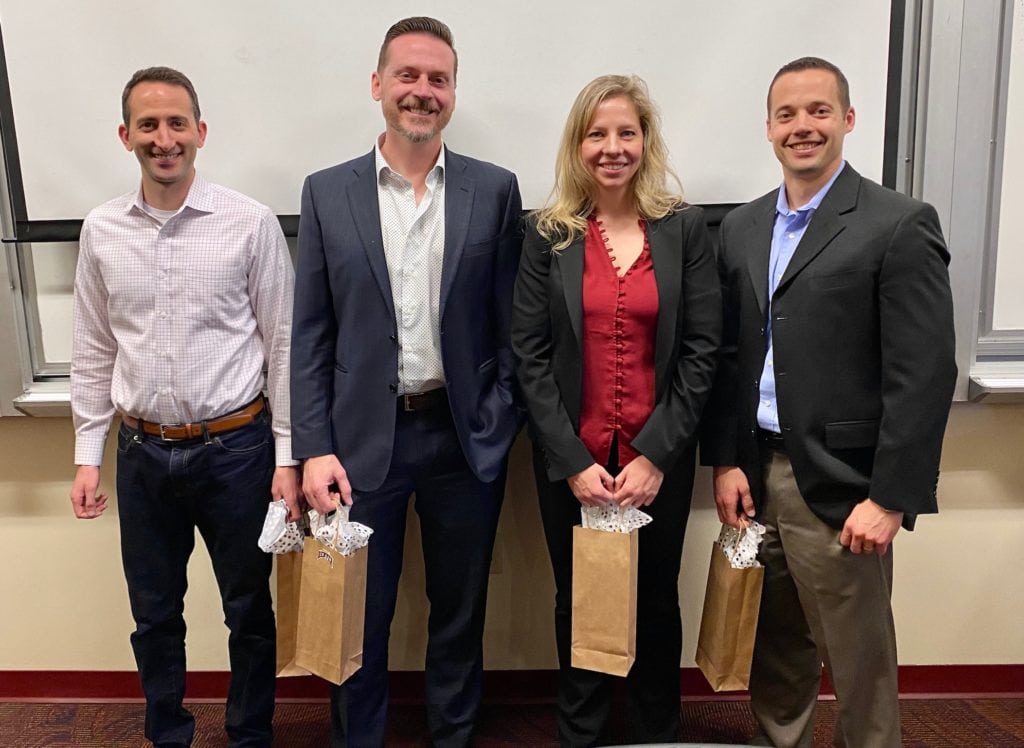Daniels Executive MBA team’s winning Social Good project implements supply management solution for first responders
When firefighters and EMTs are first on the scene of a bee sting victim in anaphylactic shock, the victim’s life hinges on receiving appropriate emergency care, which may include an injection of epinephrine.
Like many critical medications, however, epinephrine has a limited shelf life. This puts emergency response units in the tricky position of stocking enough to serve the public without creating excess waste.

2020 EMBA Social Good winning team
Executive MBA students Randy Deitemeyer, Ryan Hill, Chris Barringer and Heather Wixon combined their expertise in supply chain management, firefighting and EMS, leadership and management consultancy, information technology sales and business analysis to address this issue for the 2020 Social Good Challenge—the culminating assignment of the Daniels College of Business EMBA program.
Using a crawl, walk, run model, the team leveraged Deitemeyer’s role as a firefighter and EMT at the Larkspur Fire Protection District (LFPD) to brainstorm a solution for inventory management of the department’s EMS supplies, which they then presented to the fire chief.
Mindful of LFPD’s budget, the EMBA team combined an off-the-shelf app with an iPod Touch equipped with a barcode scanner. For a low annual subscription, the solution allows LFPD’s medical personnel to quickly scan products while replenishing on-truck supplies following dispatch calls. The department’s back-end supply manager can then review inventory in real time, which enables LFPD to buy more product when needed and dispose of medications when they expire. It takes the guesswork—and waste—out of inventory control.
The EMBA team didn’t just prototype their solution for their class project, though—they created a production-ready version for immediate implementation, offering real-life fiscal and community impacts.
Emergency medical supply inventory management affects more than 30,000 fire departments, with 1.1 million firefighters handling 22 million medical responses in the U.S. each year, according to the EMBA team’s research. The Daniels students hope their solution can eventually be scaled to meet this demand with improved and automated radio-frequency identification technology.
“If it expands to multiple firehouses in a district, there can be cross-departmental collaboration,” Deitemeyer said during his team’s presentation. “If one department is close to having medications expire, and another department is running low on those medications, they can [share their supply] to reduce waste.”
Deitemeyer, a senior IT leader at Johns Manville in addition to serving as a firefighter and EMT, said the technology can be used to track supplies of controlled substances, and even personal protection equipment like N95 masks, which are currently in high demand but short supply due to the coronavirus pandemic.
“Like any other high-value item, it’s important to manage [N95 masks] appropriately. The ability to have the correct supplies on hand is critical whether it’s for COVID-19 or anything else,” he said.
Students in Daniels’ EMBA Cohort 72 divided into seven groups to research, strategize, pitch and implement business solutions to benefit a chosen nonprofit for this year’s Social Good Challenge. Those nonprofits ranged from a horse therapy 501(c)(3) to an organization that teaches children golf and life skills. Teams gathered March 6 to present their projects to their fellow classmates and program directors.
Dan Baack, academic sponsor for the EMBA Social Good Challenge, thanked the teams for giving back to Colorado nonprofits and the public good through their projects.
“You should all be extremely proud,” he said of the students’ efforts. “It’s an important part of the ethos here at Daniels. It’s part of the brand that will be attached to your name after you graduate.”
Jan Drobnick, Executive MBA program director, added, “It’s like the butterfly effect. One small thing may have lasting changes or effects in the future that you might or might not hear about.”
Ultimately, Deitemeyer’s team won the Social Good Challenge.
“While all of the teams did a fantastic job, Randy’s team was selected due to the impact and sustainability of the outcomes from their presentation,” Baack said. “As we know all too well in our current COVID-19 context, effective management of inventory can save lives. The proposed system, with a successful pilot thanks to the EMBA team, has the potential to improve the inventory management for fire departments throughout Colorado.”
Deitemeyer explained that his team played off each other’s strengths.
“Core to our success was understanding the challenges, being collaborative and getting executive buy-in,” he said.
As for contributing to the public good, Deitemeyer added, “Being of both corporate and service mindsets in parallel is something I champion and I encourage others to do the same. I try to live the Daniels vision in my day-to-day careers. The EMBA is very business focused, but there is also the service component to it. Our team was able to really understand the drivers and how our business backgrounds could benefit the service side of the equation by playing to the strengths of both.”
